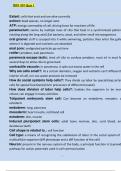Bio 353 quiz 1 - Study guides, Class notes & Summaries
Looking for the best study guides, study notes and summaries about Bio 353 quiz 1? On this page you'll find 7 study documents about Bio 353 quiz 1.
All 7 results
Sort by
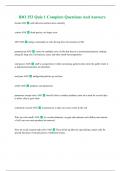
-
BIO 353 Quiz 1 Complete Questions And Answers 2024/2025 Latest Updates
- Exam (elaborations) • 11 pages • 2024
-
Available in package deal
-
- $12.99
- + learn more
BIO 353 Quiz 1 Complete Questions And Answers 2024/2025 Latest Updates Extant ANS cells that exist and are alive currently extinct ANS dead species, no longer exist ATP ANS energy commodity of cell, driving force for reactions of life paramecium ANS swims by multiple rows of cilia that beat in a synchronized pattern, rotating along the long axis. Eat bacteria, yeast, and other small microorganisms oral groove ANS stuff is scooped into it while swimming, particles then enter the...
BIO 353 Quiz 1 Complete Questions And Answers
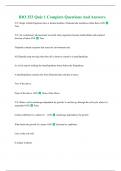
-
BIO 353 Quiz 1 Complete Questions And Answers
- Exam (elaborations) • 3 pages • 2024
-
Available in package deal
-
- $9.99
- + learn more
BIO 353 Quiz 1 Complete Questions And Answers T/F: Single Celled Organisms have a limited number of bimolecular machines within them ANS True T/F: An evolutionary advancement occurred when organisms became multicellular and acquired division of labor ANS True Filopodia contain receptors that sense the environment and: All filopodia stop moving when the cell is about to extend to a lamellopodium. As a first step in walking the lamellopodium forms before the filopodium
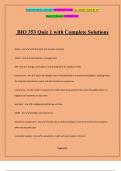
-
BIO 353 Quiz 1 with Complete Solutions
- Exam (elaborations) • 13 pages • 2024
-
- $10.49
- + learn more
BIO 353 Quiz 1 with Complete Solutions Extant - Ans:-cells that exist and are alive currently extinct - Ans:-dead species, no longer exist ATP - Ans:-energy commodity of cell, driving force for reactions of life paramecium - Ans:-swims by multiple rows of cilia that beat in a synchronized pattern, rotating along the long axis. Eat bacteria, yeast, and other small microorganisms oral groove - Ans:-stuff is scooped into it while swimming, particles then enter the gullet where it is digested...
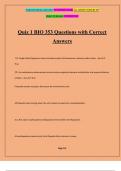
-
Quiz 1 BIO 353 Questions with Correct Answers
- Exam (elaborations) • 4 pages • 2024
-
- $9.99
- + learn more
Quiz 1 BIO 353 Questions with Correct Answers T/F: Single Celled Organisms have a limited number of bimolecular machines within them - Ans:- True T/F: An evolutionary advancement occurred when organisms became multicellular and acquired division of labor - Ans:-True Filopodia contain receptors that sense the environment and: All filopodia stop moving when the cell is about to extend to a lamellopodium. As a first step in walking the lamellopodium forms before the filopodium. A lamellopo...
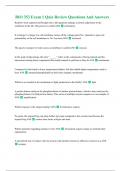
-
BIO 353 Exam 1 Quiz Review Questions And Answers
- Exam (elaborations) • 4 pages • 2024
-
Available in package deal
-
- $10.99
- + learn more
BIO 353 Exam 1 Quiz Review Questions And Answers Rainbow trout captured and brought into a lab aquarium undergo a chronic adjustment to the conditions in the lab. This process is called ANS acclimation If a change in voltage of a cell membrane causes all the voltage gated Na+ channels to open, the permeability of the cell membrane to Na+ has been ANS increased The passive transport of water across a membrane is called ANS osmosis In the study of physiology, the term "______" r...
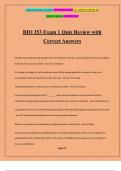
-
BIO 353 Exam 1 Quiz Review with Correct Answers
- Exam (elaborations) • 5 pages • 2024
-
- $9.99
- + learn more
BIO 353 Exam 1 Quiz Review with Correct Answers Rainbow trout captured and brought into a lab aquarium undergo a chronic adjustment to the conditions in the lab. This process is called - Ans:-acclimation If a change in voltage of a cell membrane causes all the voltage gated Na+ channels to open, the permeability of the cell membrane to Na+ has been - Ans:-increased The passive transport of water across a membrane is called - Ans:-osmosis In the study of physiology, the term "______"...

That summary you just bought made someone very happy. Also get paid weekly? Sell your study resources on Stuvia! Discover all about earning on Stuvia

